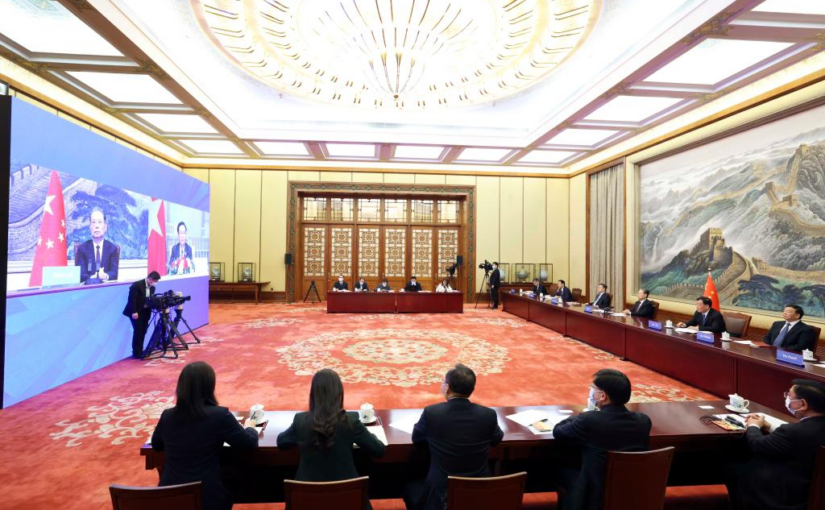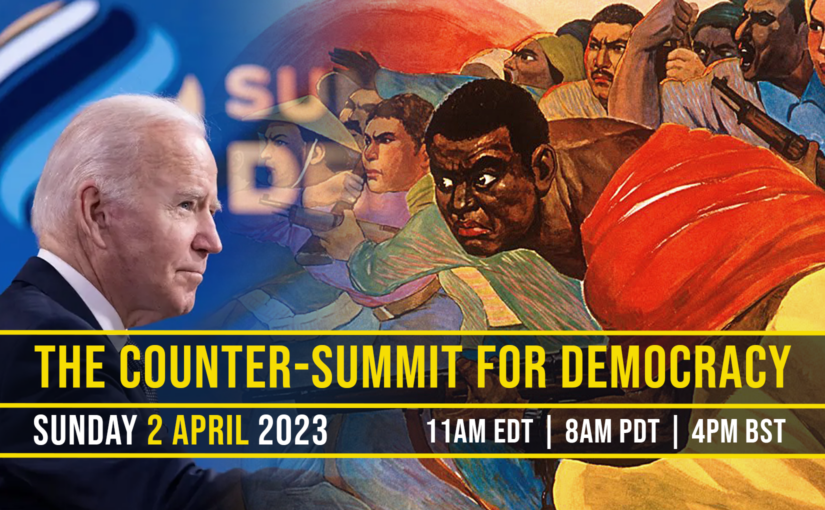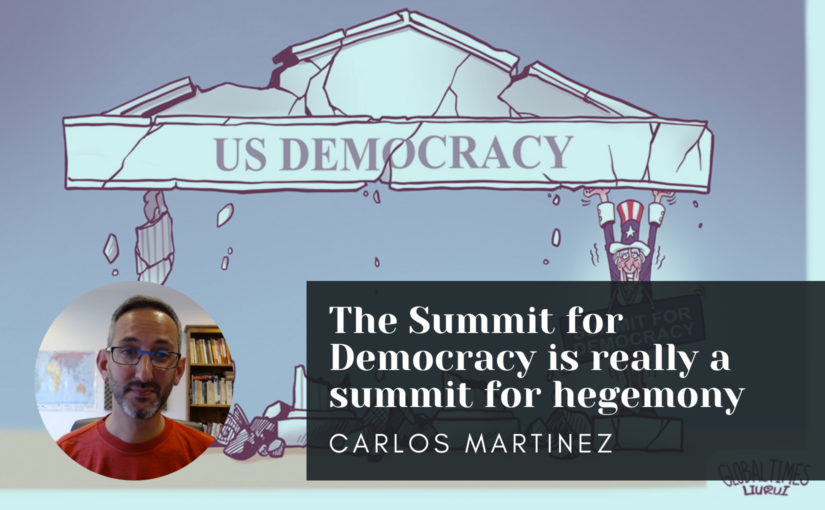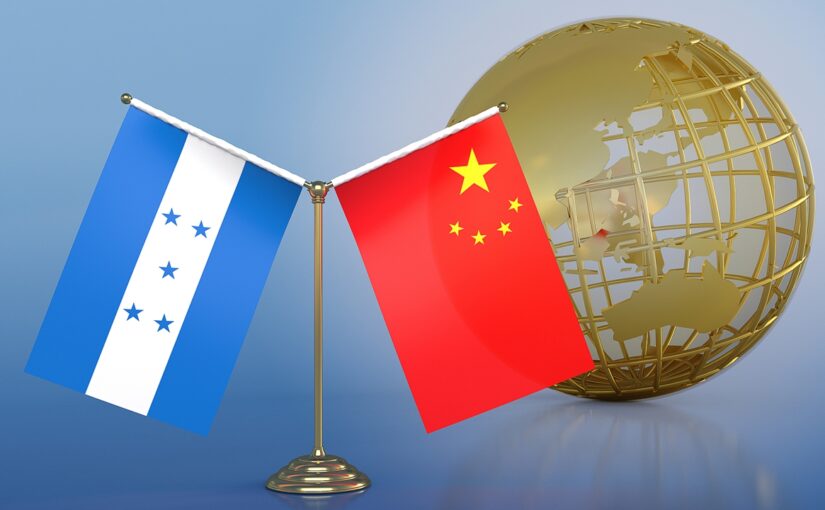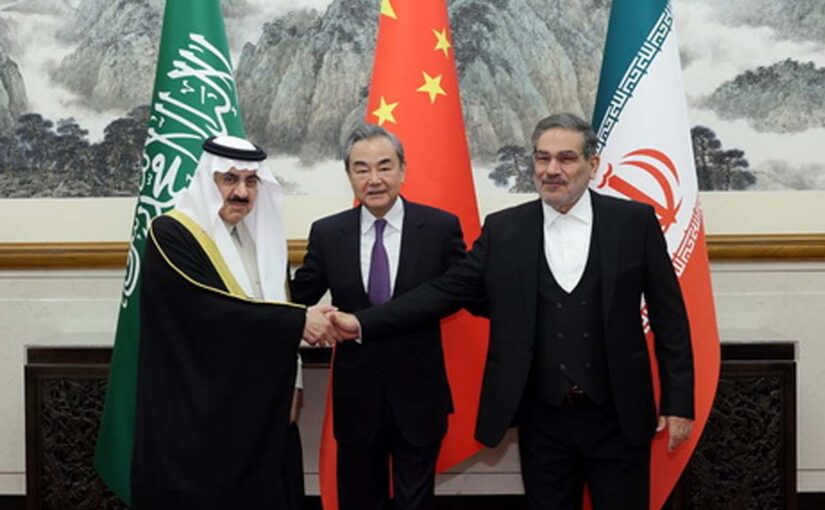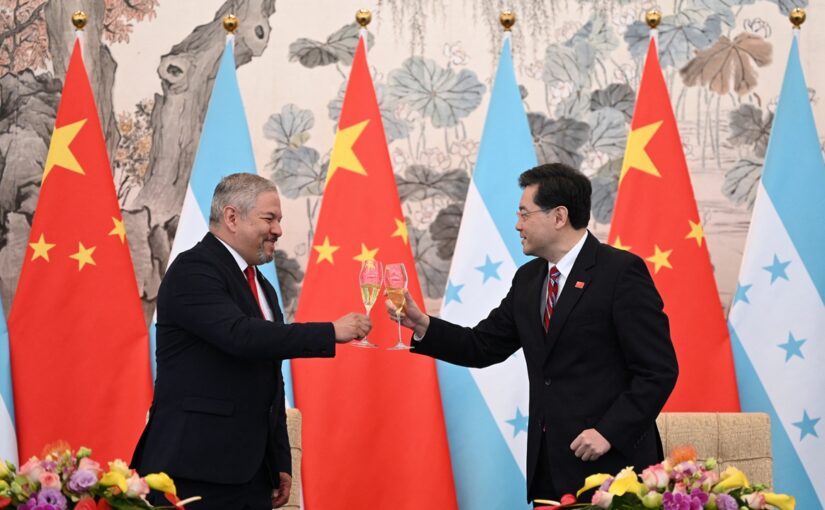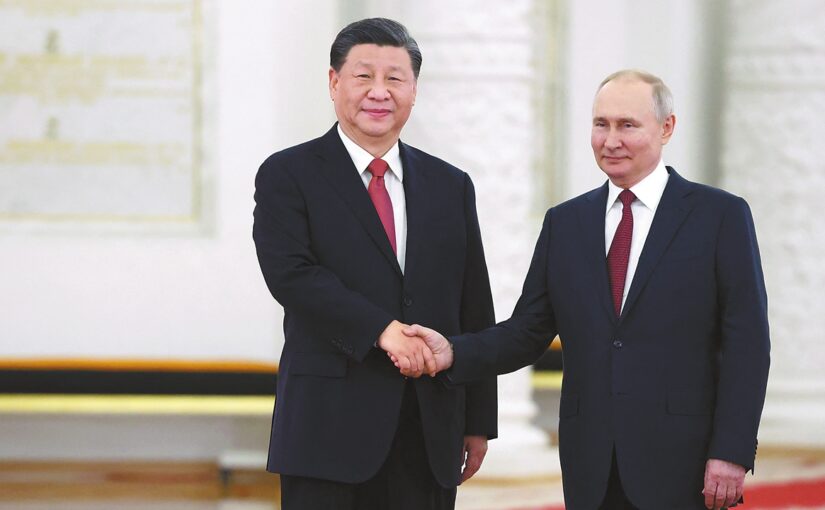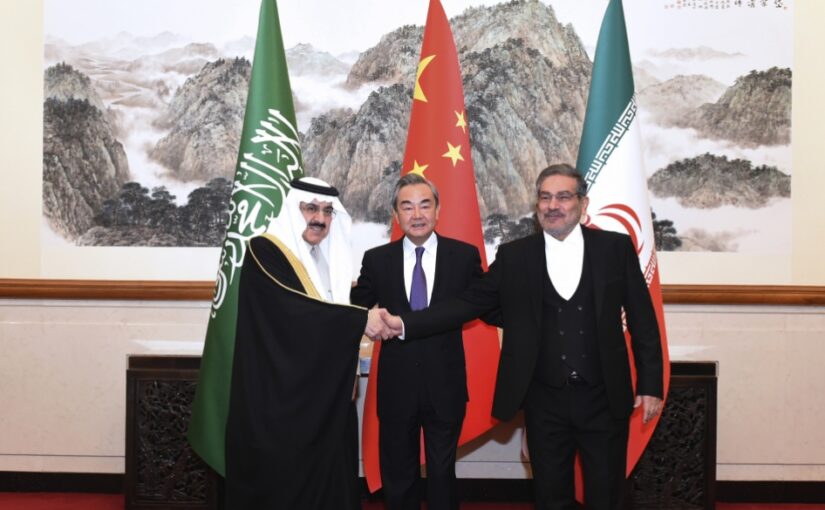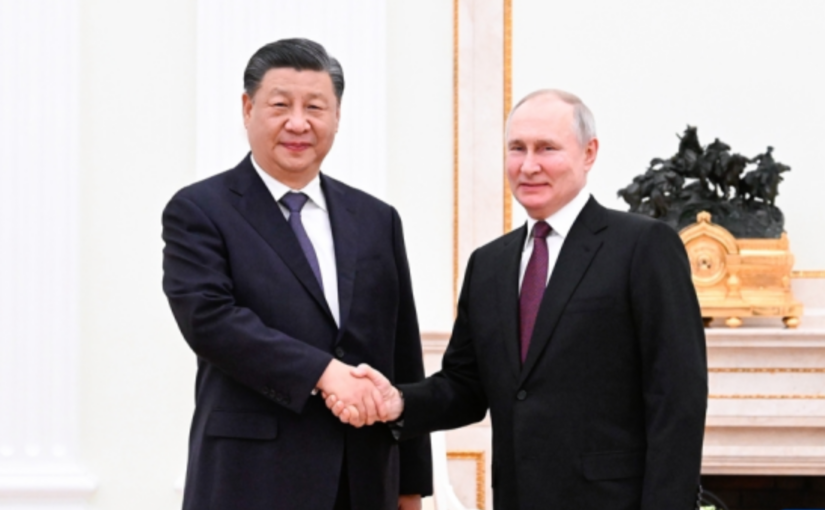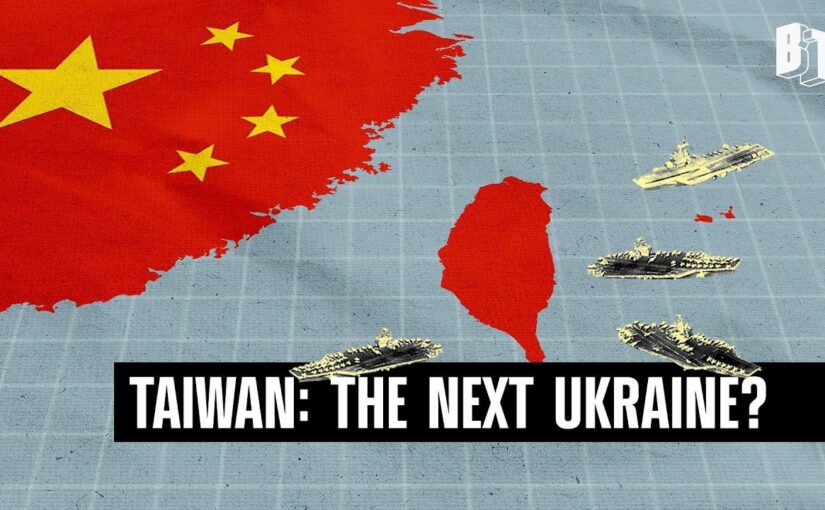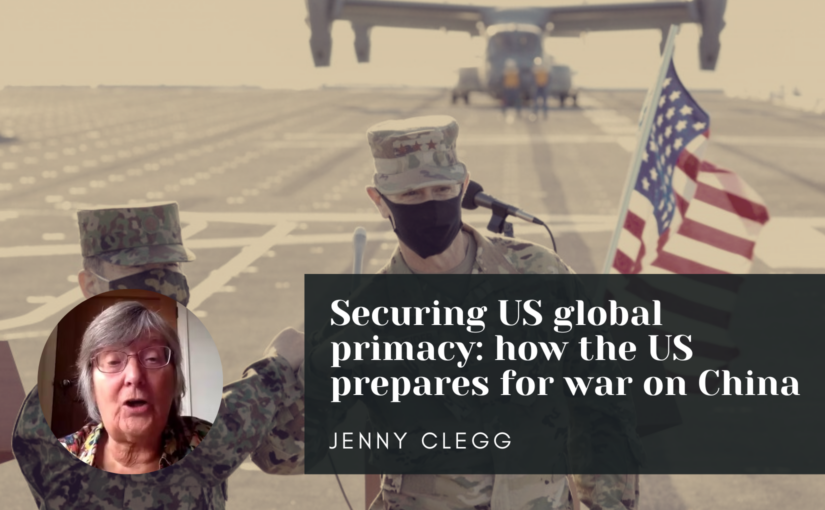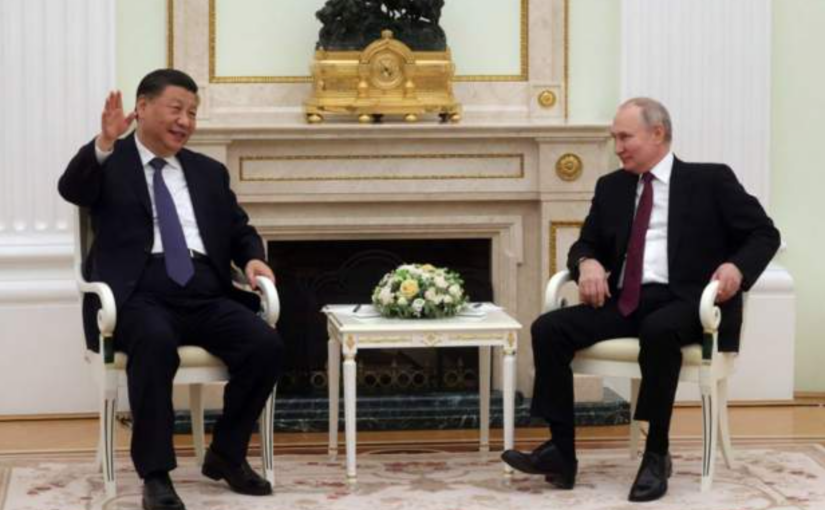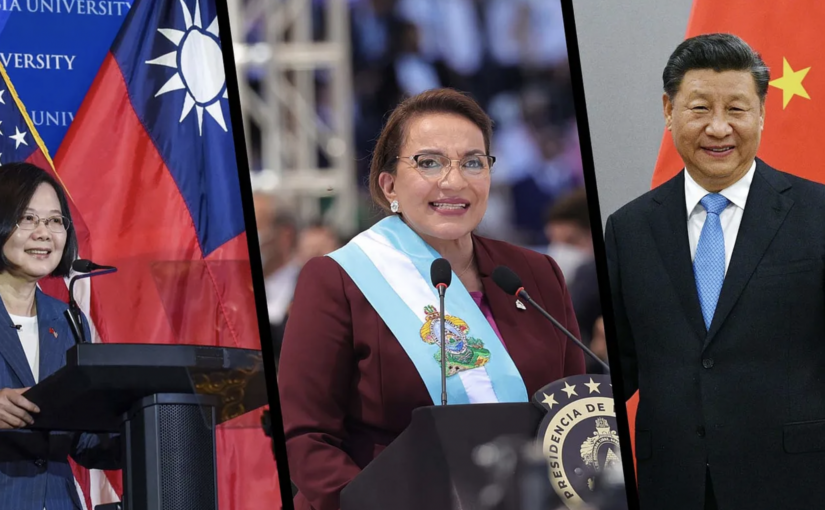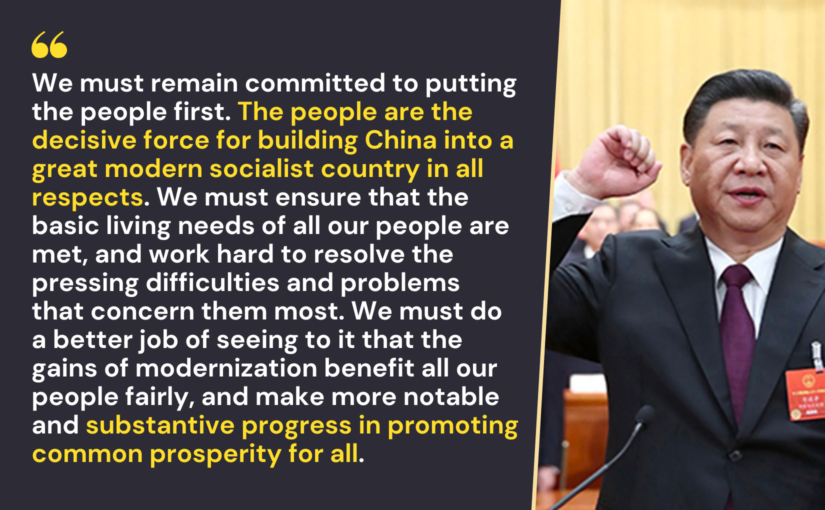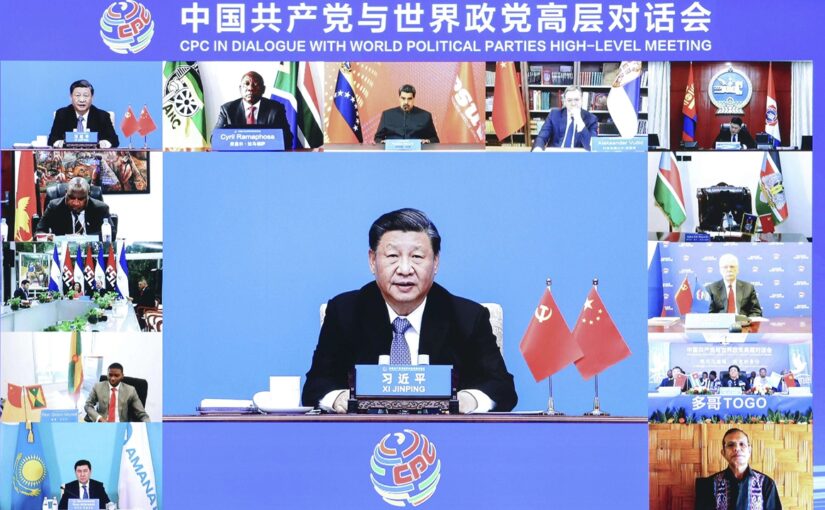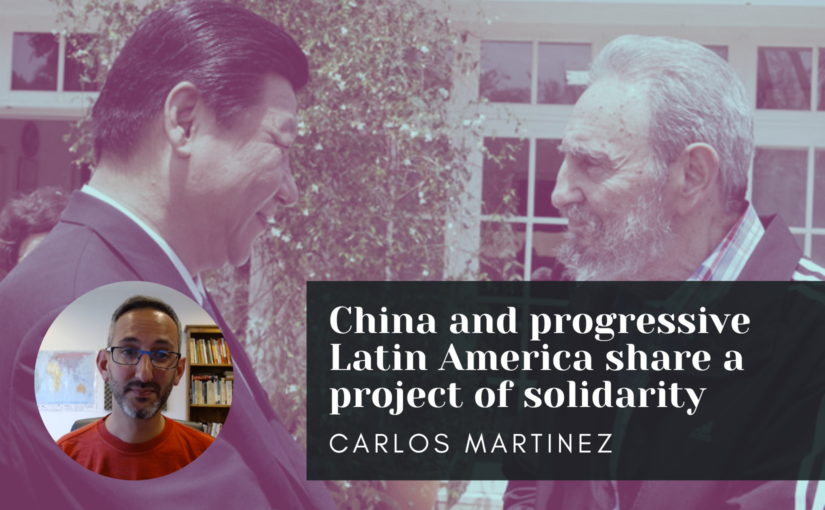In this detailed essay, British author and peace campaigner Jenny Clegg provides a comprehensive overview of the US drive to war against China.
Jenny describes the attempts being made to construct a Global NATO, leveraging AUKUS, the remilitarisation of Japan, the undermining of the One China Principle and the prolonging of the Ukraine crisis in order to link the Euro-Atlantic and Indo-Pacific theatres of war. Britain and Japan are emerging as the most important partners in this phenomenally dangerous strategy which, taken as a whole, constitutes “a historic restructuring of the international security order: strengthening of the NATO transatlantic military axis against Russia whilst elevating the US-Japan trans-pacific military axis at the core of newly created regional NATO-like multilateral security frame.”
The aim of this strategy is, of course, “to contain the growing multipolar trend”.
We must build a formidable global opposition to this warmongering. Thanks to an already-developing multipolarity, countries of the Global South are “starting to wake up to the real nature of US intentions”, and as such “a non-aligned resistance is taking shape”, with these countries asserting their sovereignty and interests. For anti-war activists in the West meanwhile, as we recall the historic protests against the Iraq War 20 years ago, Jenny writes that the task of playing our part in a worldwide mass movement for peace will require us to “resist the insidious influence of imperialism permeating through social democracy”.
The trajectory of war: Iraq then, China now?
Back in September 2002, Dan Plesch wrote an article in the Guardian entitled ‘Iraq first, Iran and China next’. Less than a year earlier, George W. Bush had put China on a nuclear ‘hit list’ along with Russia, Iran, Iraq, Syria and North Korea. Twenty years on, it seems China’s turn has arrived, now identified as ‘America’s most consequential geopolitical challenge’.
Iraq was a turning point for the world as Bush ‘seized the unipolar moment’: ‘shock and awe’ and ‘full spectrum dominance’ in air, land, sea and space presaged a new militarism to secure US global primacy; and, blatantly displacing the UN on the pretext of ‘humanitarian intervention’, the US found a new means of rallying allies in a ‘coalition of the willing’, embedding key NATO partners into ‘out of area’ operations.
All this was in line with the neocons’ Project for a New American Century which had advocated for the US pursuit of hegemony through the preeminence of its military forces.
As Plesch foresaw, the 2003 war set precedents to be used against other states that stood up against US global control. US militarism has advanced into ‘air sea battle’ plans to wipe out multiple cities across China at a single strike, with trillions of dollars sunk into upgrading ‘full spectrum dominance’ capabilities; ‘humanitarian intervention’ has evolved into a New Cold War of ‘democracies against autocracies’ edging the UN further aside. And now, using the Ukraine war to subjugate Europe and weaken Russia, the US is starting to assemble a new ‘coalition of the willing’ in the ‘defence of Taiwan’, ordering the global security architecture anew as it sets the stage for a new war on China.
But much has also changed over twenty years with the rise of China and the emergence of a multipolar world: as the economic balance shifts from West to East, countries in the Global South are not so easily influenced to follow US leadership.
What does China want?
US political elites have convinced themselves that China is bent on global hegemony. Despite Xi Jinping’s assurances to Biden that China ‘has no intention to challenge or displace the United States’, they revert to racialised stereotypes of the Chinese as inveterate liars – recall the words of the popular 1880s music hall song: ‘for ways that are dark and tricks that are vain, the Heathen China is peculiar’ – rather than face history.[1]
That China was its ally in WW2 is something the West conveniently forgets. KMT Nationalist and Communist armies successfully blocked the bulk of the Japanese forces from advancing west, a vital contribution recognised by Churchill and Roosevelt when they signed, with Chiang Kaishek, the 1943 Cairo Agreement. This stipulated that the territories seized by Japan from China, including Taiwan, be restored, and that Japan be stripped of all the islands in the Pacific seized or occupied since 1914.
As one of the allies, China took part in the establishment of the United Nations, assuming a permanent seat on the Security Council. But the UN order as based on the Cairo Agreement, confirmed in the 1945 Potsdam Declaration, was not to be. Instead, the Japan peace settlement was determined at the behest of the US by the 1951 San Francisco Conference from which both the PRC and RoC (Republic of China) and the two sides of the Korean war were excluded, with the USSR refusing to attend. US power came to prevail over the Pacific through a series of bilateral alliances and an extensive array of US military bases.[2]
Despite political improvements over time – the PRC regained the UN seat,the US and China established official ‘One China’ ties, the USSR and China reached their own peace deals with Japan – the US-dominated military pattern remained and a number of territorial issues covered by the WW2 agreements affecting the USSR/Russia as well as China were left to fester.
What China wants is to see the promise of the Yalta of the East system realised through reunification with Taiwan and from this the construction of a cooperative security arrangement for the Pacific together with the US.
Militarising the Indo-Pacific
US control over the Pacific was never complete in the face of the armed resistance of the peoples of China, Korean and Indo-China and the non-aligned leanings of South East Asia states. The US was never satisfied.
Today, claiming the Russian invasion of Ukraine ‘raises the spectre of a Chinese takeover of Taiwan’, the US is creating a new militarised order for the Indo-Pacific. Increasing its own military capabilities to hem in China’s coastline and reinforce control across the wider oceans, the US is at the same time upgrading the key regional axis of power, its alliance with Japan, now elevated into a major military player. Taking the Japan alliance and AUKUS as the core, the US is attempting to pull together a group of militarily committed powers covering the whole Pacific to oppose China.
Where previously the US pursuit of a ‘free and open’ Indo-Pacific has focused on the South China Sea, the prospect of a war over Taiwan has become the new focus.
The US is now reinforcing its force structure across the region, increasing manoeuvrability along the first island chain and plugging the gaps in this arc of alliances and bases from Japan in the North stretching down to the Philippines in the South. The US has now secured agreement with the Philippines for four new bases, three in the Northern island of Luzon, within striking distance of Taiwan. Meanwhile under the terms of the new Japan alliance, the US Okinawa base north of Taiwan is being strengthened whilst the Japanese island of Mage is being rebuilt to serve US forces. A new base is opening in Guam, the first in decades and a US nuclear submarine base is under construction in Australia.[3]
However it is the rehabilitation of Japan as a military power that is the biggest change in the region’s security pattern just as the US shifts its primary focus to the China challenge.
Japan also now identifies China as the main strategic challenge under a new National Security Strategy, the only US ally to do so. With the endorsement of its new US alliance, the country is undergoing the most radical overhaul in its regional positioning since WW2, vastly increasing its war-fighting capacity as it embarks on its largest military buildup in decades. Military spending is set to double from 1% to 2% of GDP over 5 years – from some $50 bn a year to an accumulated $318 bn – to see Japan leap to the third or fourth largest military power in the world.
Matching Japan in the North, Australia too is reconfiguring itself as a military power in the South Pacific, its military spend set to rise from around $49 bn to $57 bn per year by 2025-6. Meanwhile Taiwan’s increased budget of $19bn is being backed by the US-pledged $10bn in military aid.
For the US neocon Right, their long-held aspirations for a remilitarised Japan and an armed Taiwan serving as an ‘unsinkable aircraft carrier’ – passed from MacArthur and the McCarthyites to John Bolton and Paul Wolfowitz and now to Kagan and Blinken – are materialising.
As the US advances plans to catch Taiwan between the pincer of its forces in Okinawa and the Philippines, Biden’s constant vacillations between the One China policy and the defence of Taiwan are highly destabilising. China is committed to a peaceful reunification, yet states it will never renounce the use of force directed against interference by outside forces. The military display by the PLA following Pelosi’s August 2022 visit to the island demonstrates it is serious about this. It has the capacity: in its vast naval fleet capable of imposing a blockade on the island, and with missiles capable of sinking US aircraft carriers and destroying US warships on the far side of the island, as its recent missile overflights demonstrated.
Lying 100 miles to the north of Taiwan and less than 300 miles from the massive US airbase in Okinawa, are the disputed islands known as the Diaoyutai in Chinese and Senkaku in Japanese which may become the locus of battle given their critical importance in the event of a Chinese blockade of Taiwan.
These uninhabited islands are claimed not only by China and Japan but also by Taiwan (the Republic of China); they were taken under control by the Japanese government in 2012 and now are increasingly patrolled not only by Japanese and Chinese but also by US forces.
To defeat any move by China, the US would need a coalition of forces – and this is what the Pentagon is seeking to construct.
Towards a Global NATO
With the transatlantic NATO alliance strengthened against Russia’s military intervention in Ukraine, and a new Indo-Pacific regional security architecture emerging, the US is also working to construct a third axis under its control between the European and Asian theatres to serve as a counter to China’s Eurasian Belt and Road initiative.
AUKUS and the US-Japan alliance both offer access points for linking the security of the Euro-Atlantic to the security of the Indo-Pacific in accordance with NATO’s New Security Concept adopted at its 2022 summit.
NATO allies are getting drawn into the Indo-Pacific security pattern step by step. Military exercises have multiplied in the last year or two as a way of involving outside powers, not only the UK, but also France, which is boosting its military presence in the region. Germany has also sent in warships. NATO forces made up at least half of last year’s US-led RIMPAC (Rim of the Pacific) exercises.[4] Australia, South Korea and Japan are again to attend the 2023 NATO summit, and Japan has become a regular participant in NATO Chief of Staff meetings.[5]
So far, NATO is committed to addressing the ‘systemic competition’ from China, but Stoltenburg’s recent visits to South Korea and Japan were looking for a more strategic undertaking. Japanese PM Kishida, mirrored by Zelensky’s visits around Europe, had embarked earlier in January on a diplomatic tour to rally support, visiting the UK, France, Italy and Canada as well as the US to gain approval for Japan’s new militarist orientation.
Eliciting statements of stronger support from Macron and Trudeau, Kishida was to agree a form of strategic partnership with Meloni of Italy.
But it was Sunak that took things furthest, signing a Reciprocal Access Agreement to allow the two nations to deploy military forces on each other’s soil. This represents Japan’s first military agreement with a European power.
The UK leads the way
The UK and Japan began to deepen military cooperation with the visit of the Queen Elizabeth carrier strike group in 2021.
This was followed in November 2022 with an agreement on new UK-Japan-Italy partnership – the Global Combat Air Programme (GCAP) – a hi-tech programme for unmanned aircraft and cutting-edge weapons heralded as an ‘unprecedented international aerospace coalition’. BAE Systems, Rolls Royce and MBDA are to work together with Leopard in Italy and Mitsubishi in Japan to deliver next generation combat fighter jets. The Tempest is to replace the Typhoon aircraft by the mid 2030s; its capacity to carry hypersonic missiles will significantly increase Japan’s capabilities in joining a US war with China.[6]
Also in November 2022, a ‘Vigilant Isles 22’ joint exercise simulated the retaking of an island under enemy control. The new RAA aims to regularise such exercises in ‘island defence’.[7] This should set alarm bells ringing.
Similar to ones agreed by the US and Australia with Japan, these arrangements gain significance together as providing the US with the means to break a blockade of Taiwan: the RAA could bring British forces into direct conflict with China given the deepening Sino-Japanese island dispute.[8]
The RAA and GCAP are designed to sit alongside AUKUS and with the US and Australia also having access agreements, few barriers remain for Japan to join the ‘Asian NATO’.
For the UK, the deals cement Global Britain’s Indo-Pacific tilt, breaking new ground in military relations with Japan as an example for other NATO members to follow. As it opens the door for a wider international recognition of Japan’s rehabilitation as a military power countering any residual reluctance to do so given its past history, the UK is playing a significant role in the shift to a new Indo-Pacific security architecture.
At the same time, as the US’s key ally in the West, its links with Japan the US’ key ally in the East create a new global axis linking the Euro-Atlantic and Indo-Pacific theatres of war.
As it looks to build a future beyond Brexit, Global Britain follows the US in tying future prosperity to military development – arms manufacture and arms exports. Here it aims to serve as a new model of Western 21st century power ‘creating jobs, saving lives’ as through GCAP it boosts its ‘world beating defence industry’ to promote high-high-skilled employment, drive innovation, and open up markets in both Europe and Asia.
Aiding and abetting the US, the UK similarly indulges the military aspirations of Japan’s right wingers, long held in restraint by its constitutional pacifism. Now GCAP subverts Article 9 of Japan’s constitution, the ‘peace clause’, by developing Japan’s counterstrike – that is – offensive capabilities.
Shockingly, the UK Prime Minister’s office was to draw parallels between the RAA and the Anglo-Japanese alliance of 1902.[9] Forged to counter Russia’s expansion to the East at the time, the alliance oversaw a twenty year period of Japan’s rapid military industrialisation which then drove its bloody expansion across Asia.
US progress after WW2 on democratising and demilitarising Japan ground to a halt after the CPC victory in China in 1949. Suspected Class A war criminals, such as the grandfather of former prime minister Shinzo Abe, were released from jail to help form the Liberal Democratic Party which has now held power almost continuously over the last 70 years. Senior political figures in Kishida’s government continue to visit the Yasukuni shrine to the war dead which still memorialises those convicted of war crimes.
It did not seem to bother either Biden or Sunak in promoting collaboration between Lockheed Martin and BAE Systems respectively with Mitsubishi to restore its role in arms manufacturer, that the company’s owners are yet to meet South Korean demands for compensation for the use of forced labour in WW2. South Korea and Japan have recently announced some measures to ease these particular tensions.[10]
Constructing a new coalition
The US perceives the ‘security threats of the future’ – China – to be of such an order as to demand an entirely new response. Learning the lesson from the Iraq war not to alienate allies, the US seeks to secure military pacts and alliances through a fusing of economic and technological resources into their structure.
US Secretary of State Blinken states: ‘whether techno-democracies or techno-autocracies are the ones who get to define how technology is used … will go a long way toward shaping the next decades.’
AUKUS and the UK-Italy-Japan GCAP have both been designed to set the pace in the military use of new technologies, integrating security- and defence-related science and technology as well as arms production bases and supply chains centred on US core technologies. France, Italy, Germany as well as the UK are mentioned in Japan’s National Defense Strategy as partners with whom the government will work for training and exercises, defence equipment and technology cooperation.[11]
Meanwhile the Quad, falling short of a fully-fledged military alliance, uses Australia and Japan as a means to draw India closer to the US.
Rather, then, than relying simply on formal alliance structures, the US is making good use of unconventional arrangements and linkages to draw others along in the slipstream of its agenda, knitting an array of supporters together around the militarised core – all singing from the same hymn sheet of ‘freedom and democracy’.
Revolutions in technology and communications are opening new opportunities to broaden the more flexible ‘coalition of the willing’ format to a wider range of partners involved in a hybridised warfare.
Short of actual military engagement, support can come in various ways – through the provision of material, arms, logistics, economic and technological assistance, and through participation in economic warfare with sanctions along the lines of the informal groups now aiding Ukraine. Arrangements involving data- and technology-sharing, and exclusive supply chains can serve as a dragnet to draw ‘democratic’ states away from economic and diplomatic links with ‘authoritarian regimes’.
In this way the emerging pattern of US military hegemony is being underpinned by the globalisation of what former CIA analyst Ray McGovern has called a new Military-Industrial-Congressional-Intelligence-Media-Academia-Think-Tank (MICIMATT).[12]
Towards a new World War
With the Iraq war underway by March 2003, the US effectively stepped back from a fight on two fronts, agreeing within months to join the six-party talks on Korean denuclearisation. Today, in contrast, it is shifting from the strategy of containment, prolonging the conflict with Russia in Ukraine in order to gear up for war with China.
What is taking place is a historic restructuring of the international security order: strengthening of the NATO transatlantic military axis against Russia whilst elevating the US-Japan trans-pacific military axis at the core of newly created regional NATO-like multilateral security frame. Meanwhile the UK-Japan military pact together with the increasing presence of NATO in Asia are laying the preliminary groundwork to complete the third axis of its triangle of global power, between the Euro-Atlantic and the Indo-Pacific.
Not since WW2 with the Axis powers of Japan, Italy and Nazi Germany coordinating the worldwide fascist offensive, have these two theatres of war been bridged in this way, and not for want of the US trying.
Through these three axes of a Global NATO, the US aims to contain the growing multipolar trend. A key here is to block the Eurasian link: the prolongation of the Ukraine war is helping to drive China and Europe apart, as China maintains neutrality whilst Europe demands it take a position on what it sees as its existential priority.
The US is applying immense pressure to achieve this, endeavouring to break the remaining post WW2 pacifist restraints in the Indo-Pacific as it has been doing in Europe so as to achieve these goals.
Actually it is NATO that is being positioned to cover and play the coordinating role between the two theatres, with the US pushing plans at the next summit to prepare for fighting on the home front and beyond NATO borders simultaneously. Europe will be under great pressure to increase spending on weapons procurement to free the US to move more of its assets closer to China.[13]
The major world powers are close to a stand-off – the last time this happened it ended indeed in world war. The UN has become a battleground for the New Cold War as US-influenced motions are designed to divide the ‘democracies’ from the ‘autocracies’. The UN Charter represents the deep learning from the horrors of the two world wars, lessons which are embodied in its institutional design built to maintain world peace. The UN is now under existential threat. Should war break out directly between the permanent members of the UN Security Council – the US and UK versus Russia and China – this would finally finish off the organisation. What then is left to prevent another word war?
One cannot help but wonder at the key players following the US into this deadly situation: the Anglosphere AUKUS pact intervening in an Asia becoming accustomed to managing its own affairs and a remilitarised Japan with its dark past to lead the region, partnering up in Europe with Italy, its former fascist ally and a Britain deluded by fantasies of past imperial glory.
But countries in the Global South are starting to wake up to the real nature of US intentions – to perpetuate its own and the West’s supremacy – and a non-aligned resistance is taking shape as they refuse to take sides over Ukraine.
More and more developing countries will be looking to China and others in the BRICS for economic stabilisation with the prolongation of the war further damaging further the prospects of world economic recovery after COVID.
The Iraq war unleashed over a decade of disruption for the Middle East, leaving the region even further divided: the countries of East Asia hardly want to see this happen to them. US plans to remilitarise and divide East Asia threaten to derail their promising prospects of further economic development, destabilising a region vital to the world’s future prosperity and the battle against climate catastrophe and not least at risk of nuclear proliferation.
Nor is Japan’s rearmament welcome in the region: not only China and the Koreas remain sceptical as to the sincerity of Japan’s apologies for its past, but other Asian nations, whose memories of Japan’s WW2 brutality and military-colonial occupations live on, may also be wary. Indications are that the Japanese public themselves will not support increased taxes to cover the proposed rise in military spending.
Meanwhile, new US proposals that allies host more intermediate range missiles in the region are being met with reluctance not only Thailand and the Philippines but also Australia, South Korea and Japan.[14]
Ahead of the G7 summit, planned to take place in Hiroshima and built up by Kishida’s January tour of the Western powers, is intended to send a strong signal of their unity both to Russia and China. A visit by Kishida to Kiev is also on the cards.
With the Ukraine crisis threatening to escalate into a direct clash between major powers, China has stepped forward with guidelines for a political settlement backed by a concept paper for a new global security. It may be that the Global South, still rather disorganised, will find direction under China’s proposals and start to set a limit to the US-led wider war preparations.[15]
The world is changing very fast indeed.
Peace and anti-war activists in the West seek to draw inspiration from the massive protests against the Iraq war, but to resist the insidious influence of imperialism permeating through social democracy requires a deeper historical and international understanding to unite a new worldwide mass movement for peace and common security.
[1] E.Ayketin “China has no intention of challenging the US: Xi Jinping” Nov 15, 2022 https://www.aa.com.tr/en/asia-pacific/china-has-no-intention-of-challenging-us-xi-jinping/2738050
[2] John W. Dower, The San Francisco System: past, Present and Future in US-Japan-China Relations, Asia Pacific Journal February 23, 2014, Vol. 12, Issue 8, No. 2 https://apjjf.org/2014/12/8/John-W-Dower/4079/artcile.html
[3] For details on the US military build up in the Pacific see Michael Klare, The Pentagon prepares for island combat in the Pacific as US-China tensions rise https://truthout.org/articles/pentagon-prepares-for-island-combat-in-the-pacific-as-us-china-tensions-rise/
[4] A. Wright “Largest ever US-Nato naval war drills in Pacific a Threat to Peace and Marine Life”, June 22, 2002 https://www.codepink.org/us-nato-naval-war-drills
[5] R. Nemoto, “Japan’s top uniformed officer to attend 1st NATO military chiefs meeting” May 17, 2022 https://asia.nikkei.com/Politics/International-relations/Japan-s-top-uniformed-officer-to-attend-1st-NATO-military-chiefs-meeting
[6] K. Inagaki, L. Lewis and S. Pfeifer, “The fighter jet that could create a new alliance between the UK and Japan” Financial Times Nov. 27, 2022 https://www.ft.com/content/a013530d-82f9-4a89-b5cf-5d76032d8c47
[7] A. Chuter, UK, Japan ink agreement to enable bilateral troop deployments, Defence News, Jan 11, 2023 https://www.defensenews.com/global/europe/2023/01/11/uk-japan-ink-agreement-to-enable-bilateral-troop-deployments/
[8] The US is also now pushing the Philippines into a similar arrangement so that not only could Philippines’ forces be deployed in Japan but Japanese forces be deployed say in Luzon.
[9] Downing Street Press release, Jan 11 2023 https://www.gov.uk/government/news/prime-minister-hosts-japanese-pm-and-agrees-historic-defence-agreement
[10] A. Jung-a and K. Inagaki “US hails thaw between Seoul and Tokyo” Financial Times March 7 2023
[11] National Defense Strategy Dec 16, 2022 https://www.mod.go.jp/j/approach/agenda/guideline/strategy/pdf/strategy_en.pdf
[12] R. McGovern US-Russia Talk About Where Not To Place Missiles, Jan 11, 2022
https://original.antiwar.com/mcgovern/2022/01/10/us-russia-talk-about-where-not-to-place-missiles/
[13] https://www.bloomberg.com/news/newsletters/2023-02-14/nato-looks-at-raising-defense-spending-target
[14] Rand Corporation, Ground-Based Intermediate-Range Missiles in the IndoPacific: assessing the positions of US Allies https://www.rand.org/pubs/research_reports/RRA393-3.html
[15] China’s Foreign Ministry Proposals for a Political Settlement of the Ukraine Crisis https://www.fmprc.gov.cn/mfa_eng/wjdt_665385/2649_665393/202302/t20230224_11030713.html


